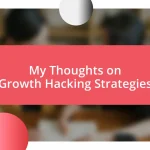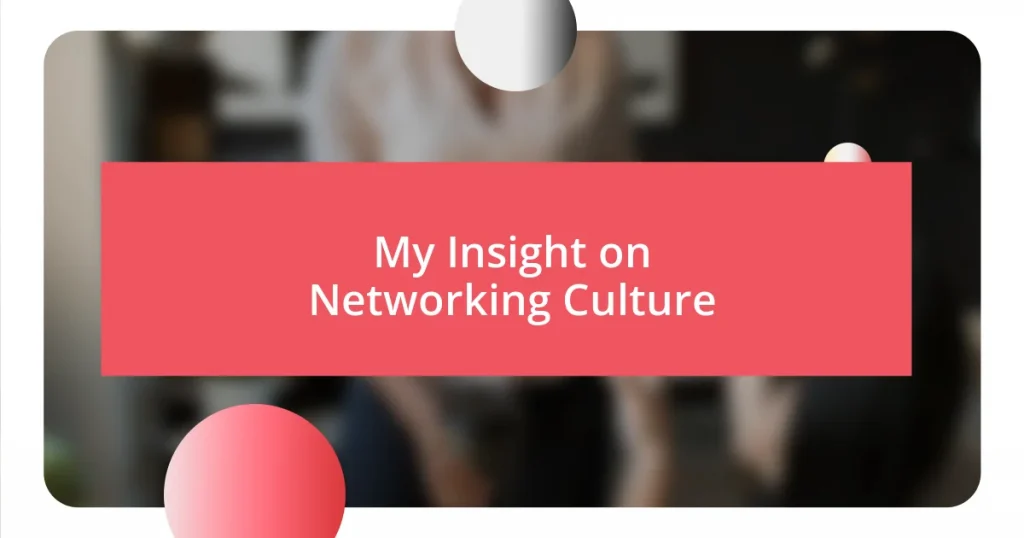Key takeaways:
- Networking is about building genuine relationships that foster collaboration and growth, going beyond mere contact exchanges.
- Diversity in networking enriches interactions and can lead to innovative ideas and opportunities through exposure to different perspectives.
- Success in networking should be measured by the quality of relationships and meaningful opportunities created, rather than the quantity of connections.
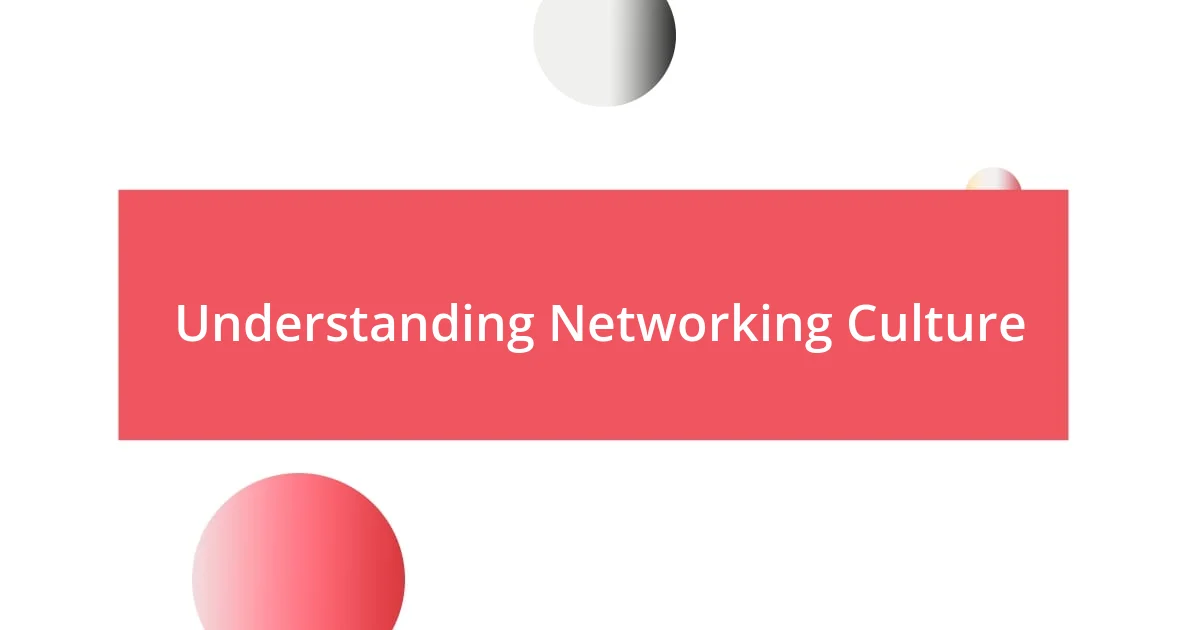
Understanding Networking Culture
Networking culture is a fascinating tapestry woven from shared experiences and relationships, both formal and informal. I remember my first professional networking event; it felt intimidating yet exhilarating. Engaging with strangers over common interests opened doors to opportunities I never anticipated, reminding me how powerful connection can be in shaping our career paths.
In my experience, true networking goes beyond exchanging business cards or LinkedIn connections; it thrives on genuine relationships. When I reached out to a former colleague to catch up, I discovered they had just launched a startup. This unexpected reconnection not only reignited our friendship but also led me to mentor them, showcasing how a simple conversation can lead to collaboration and growth. Isn’t it interesting how some of the best opportunities arise from the most authentic interactions?
I’ve often pondered why some people seem to effortlessly navigate networking while others struggle. While confidence plays a role, I believe that vulnerability can be equally powerful. I once attended a networking event where I openly shared my challenges in transitioning careers. To my surprise, quite a few attendees resonated with my story. It made me realize that being authentic in a networking culture not only helps build trust but also fosters lasting connections.
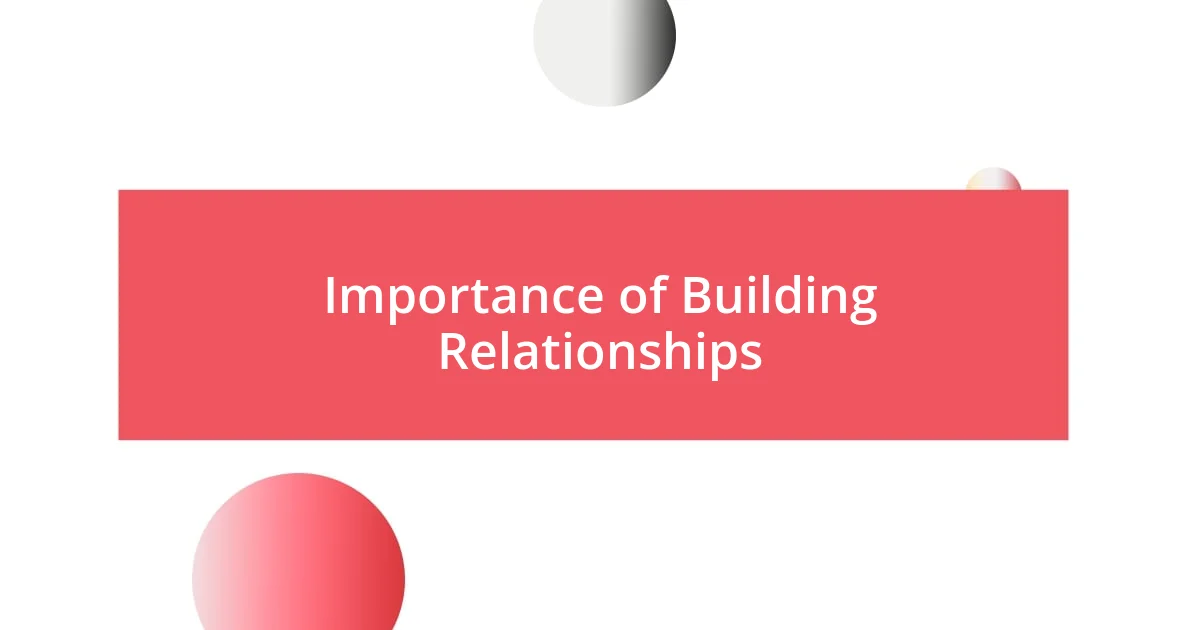
Importance of Building Relationships
Building relationships in a networking culture is essential because they create a foundation of trust and collaboration. I recall a time when I befriended someone at a conference who later became my accountability partner. This relationship transformed my approach to professional growth, as we continually challenged and supported each other towards our goals. Without that connection, I doubt I would have achieved the same level of success.
Moreover, relationships can often lead to unexpected opportunities. I once mentioned a specific skill I was working on to a contact at an industry meet-up. Little did I know, they were actively seeking someone with that expertise for a project. This casual conversation not only landed me a rewarding contract but also deepened my professional bond with them. It reinforces my belief that active engagement in networking is about nurturing connections and opening yourself up to possibilities.
Building relationships also enhances personal growth, allowing us to learn from one another. I vividly remember teaming up with a colleague whose perspectives on leadership challenged my own. Discussing our differences helped me develop a more well-rounded approach to my work. It’s funny how just one relationship can shift your mindset and encourage you to step out of your comfort zone.
| Element | Importance of Building Relationships |
|---|---|
| Trust | Establishing mutual trust leads to greater collaboration and support. |
| Opportunities | Connections can open doors to unexpected job offers or partnerships. |
| Growth | Sharing experiences fosters personal and professional development through learning from others. |
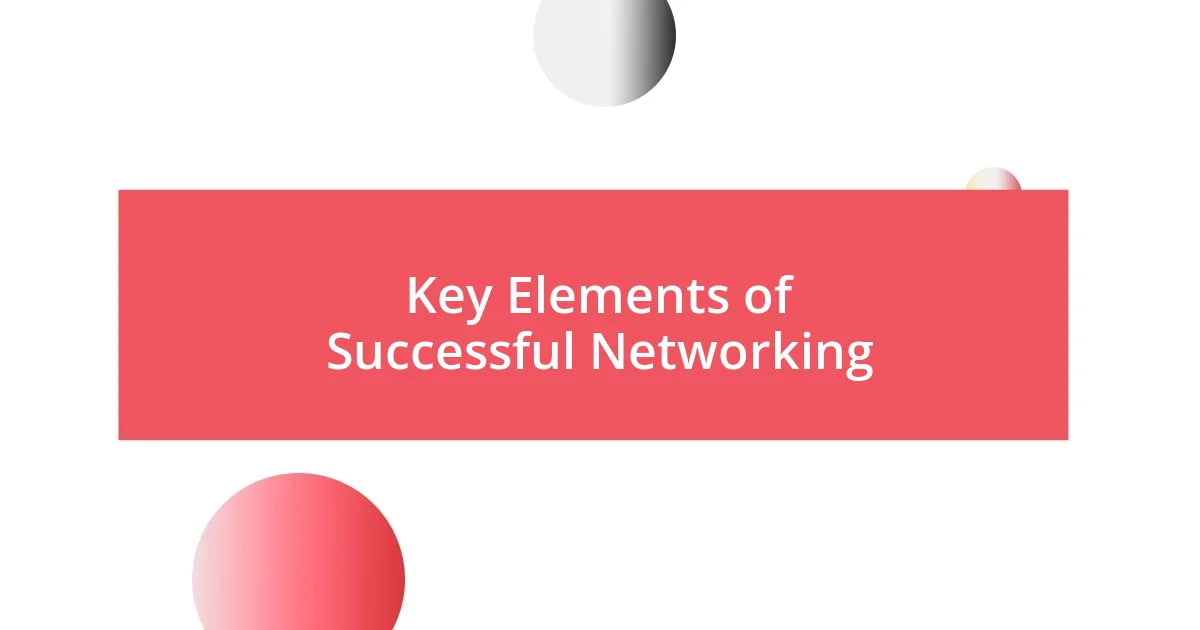
Key Elements of Successful Networking
Networking is about more than just meeting new people; it requires a thoughtful approach to foster fruitful connections. I often find that active listening plays a vital role in successful networking. At a recent workshop, I genuinely engaged with a fellow attendee who was sharing their journey in the industry. By asking questions and really hearing their story, I uncovered a shared interest that led to an exciting collaboration later. It reminded me that sometimes, the most valuable connections stem from simply being present in the moment.
Here are some key elements that contribute to effective networking:
- Authenticity: Be yourself; people connect with the real you.
- Active Engagement: Show genuine interest in others’ stories and experiences.
- Follow-Up: A simple message after a meeting can reinforce connections.
- Diversity: Embrace different perspectives by connecting with people from varied backgrounds.
- Mutual Benefit: Look for ways to add value to others, not just yourself.
Finding the balance between giving and receiving in networking can elevate your interactions. I recall a particular instance where I offered to assist a contact with their event planning. In return, they later referred me to an invaluable mentor, which highlights how a little generosity can trigger a cascade of opportunities. Such experiences teach me that networking isn’t merely transactional—it’s about building a community where we support one another.
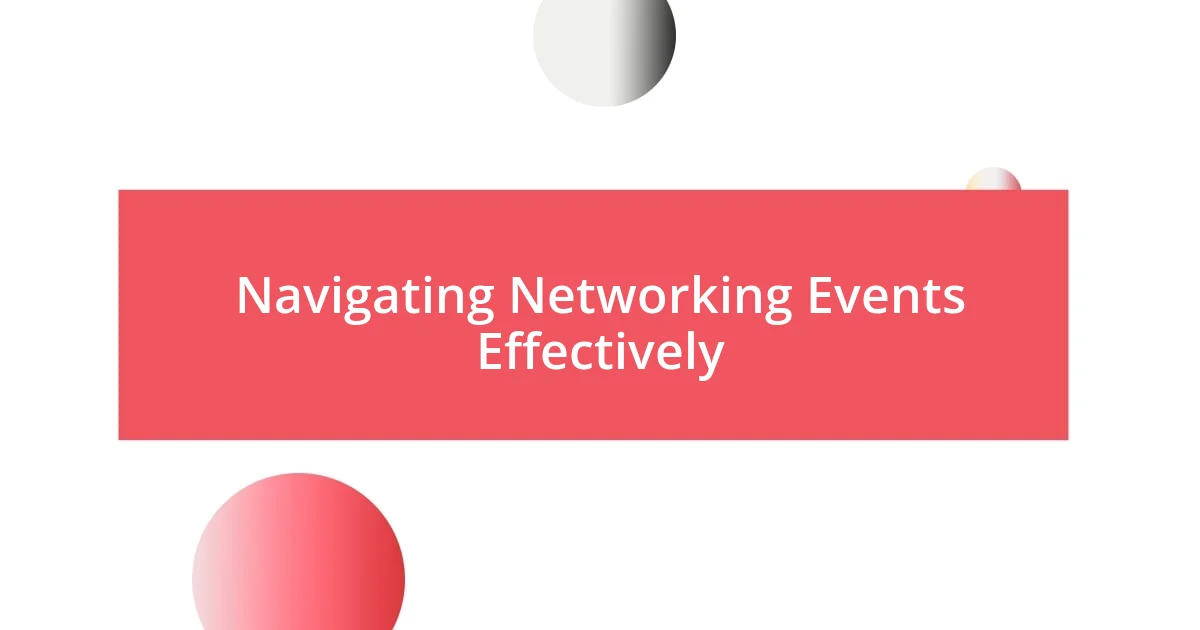
Navigating Networking Events Effectively
Navigating networking events effectively often boils down to preparation and mindset. I remember attending a large conference where the sheer number of attendees felt overwhelming. To tackle this, I set specific goals, such as talking to at least five new people. By breaking the event into manageable steps, I found myself more focused and less anxious about making connections. Have you ever felt lost in a crowd? I assure you, having a plan transforms the experience.
Dress the part, but feel comfortable. I once showed up to a networking event in overly formal attire, and it made me feel out of place. Instead of focusing on engaging conversations, I spent most of the time adjusting my collar and worrying about my appearance. When I switched to a more casual yet professional outfit, I felt liberated and confident, which allowed me to connect more authentically. It taught me that your attire should enhance your confidence, not inhibit it.
Follow-up is a cornerstone of effective networking. After a particularly inspiring luncheon, I took the time to send personalized messages to everyone I had met. I referenced our discussions, reminding them of the shared interests we uncovered. It wasn’t long before I received invitations to collaborate on projects, proving that those small, thoughtful gestures can make a big difference. What better way to solidify a new connection than reminding them of the connection you created together?
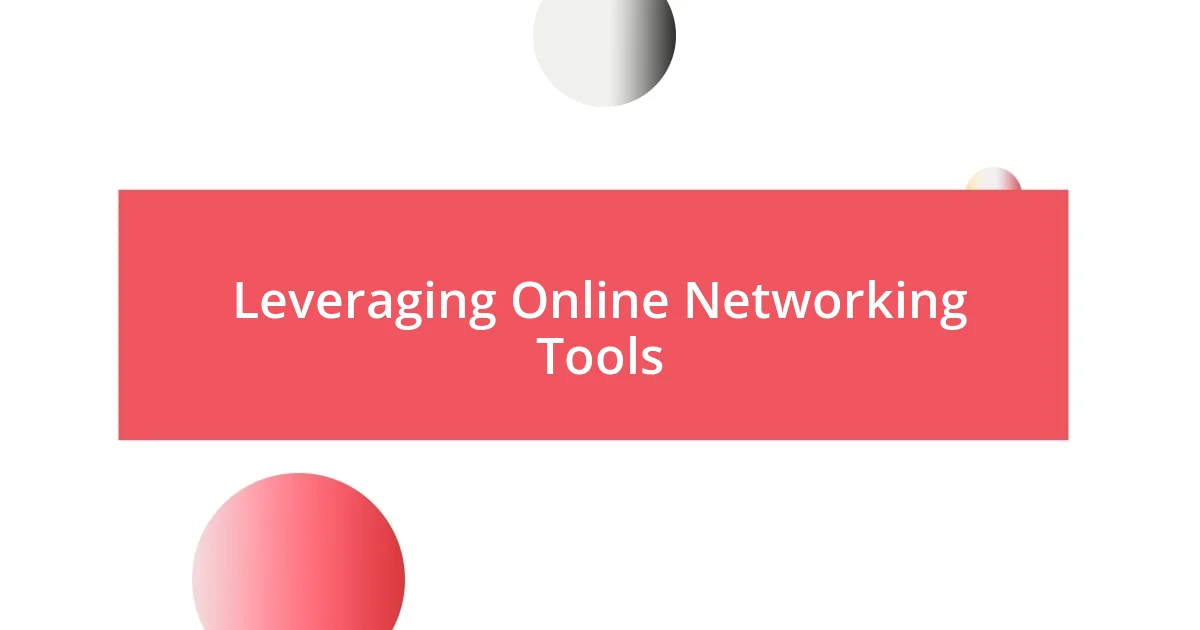
Leveraging Online Networking Tools
Leveraging online networking tools can open doors that traditional methods often leave closed. For instance, I remember the first time I used LinkedIn to connect with industry leaders. I crafted a thoughtful connection request, referencing a post that resonated with me. Surprisingly, that single message led to a meaningful conversation and later, an invitation to collaborate on a project I was passionate about. It’s a wonderful reminder of how a few well-chosen words can create lasting professional bonds in the digital realm.
Platforms like Zoom or Slack have revolutionized how we maintain these connections, especially when face-to-face meetings aren’t feasible. I’ve joined various online communities that share my interests, from tech innovations to creative writing. The interactions there have often gone beyond just sharing ideas; they’ve blossomed into friendships and mentorships. Have you ever thought about how a simple chat in a virtual space can evolve into real-life opportunities? It’s fascinating how these tools can cultivate an enriching network with just a few clicks.
Don’t overlook the power of social media to amplify your reach. I once attended a virtual conference and made it a point to engage actively on Twitter during the event. By sharing insights and tagging speakers, I caught the attention of several professionals. One even reached out afterwards to discuss our mutual interests. This experience taught me that being proactive online can spark conversations, turning virtual interactions into potential collaborations. Have you explored how your online presence can enhance your networking efforts? Trust me, the possibilities are endless!
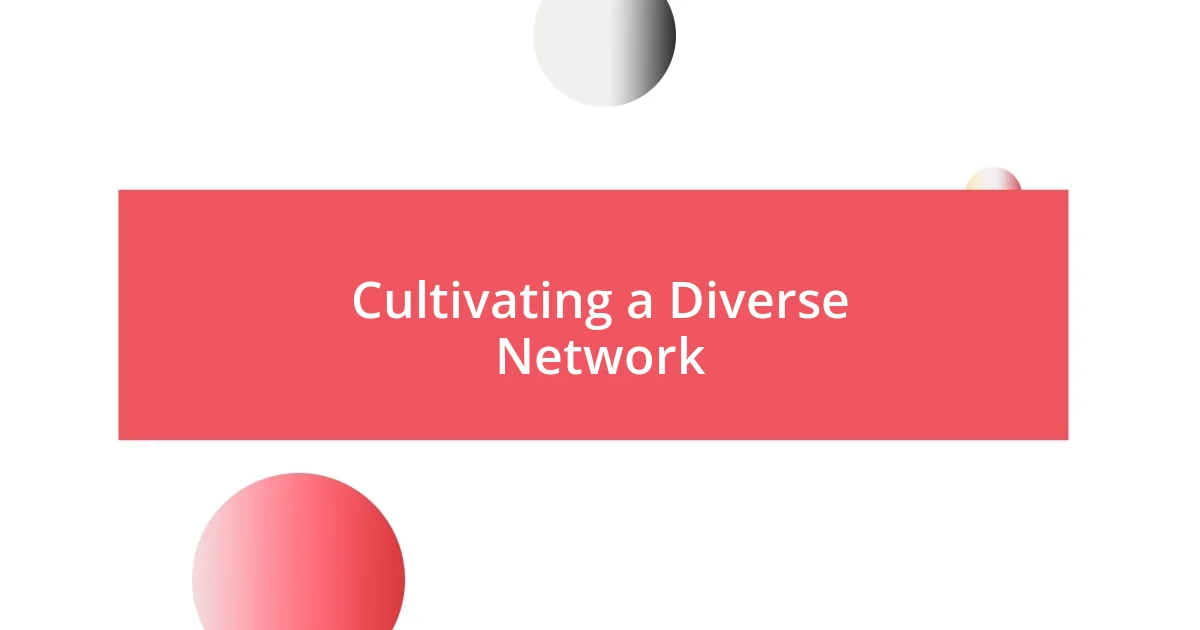
Cultivating a Diverse Network
Cultivating a diverse network isn’t just a good idea; it’s essential for growth. I remember feeling hesitant at my first multicultural event, unsure of how to engage with people from different backgrounds. But when I finally took the leap and began conversations, I discovered fresh perspectives that expanded my worldview and opened up new opportunities. Have you ever thought about how diversity can ignite creativity in your professional life? It’s incredible to see how varied experiences enrich our interactions.
Being intentional about diversity in networking starts with seeking out different perspectives. I actively seek opportunities to connect with individuals from different industries, traditions, and demographics. I once attended an art exhibit with a friend who worked in the non-profit sector. The conversations we had that night, blending art and social causes, gave me ideas I would have never encountered in my usual circles. It’s often in spaces outside our comfort zone where the most profound ideas and collaborations form.
One of the most beautiful aspects of a diverse network is the possibility of uncovering common ground amidst differences. During a panel discussion on entrepreneurship, I met someone whose background was worlds apart from mine. Despite our different journeys, we bonded over shared values of innovation and social impact. This connection led to brainstorming sessions that infused my projects with unexpected insights and solutions. Can you imagine how powerful it is to learn from someone who sees the world differently? That’s the magic that a diverse network brings to our lives.
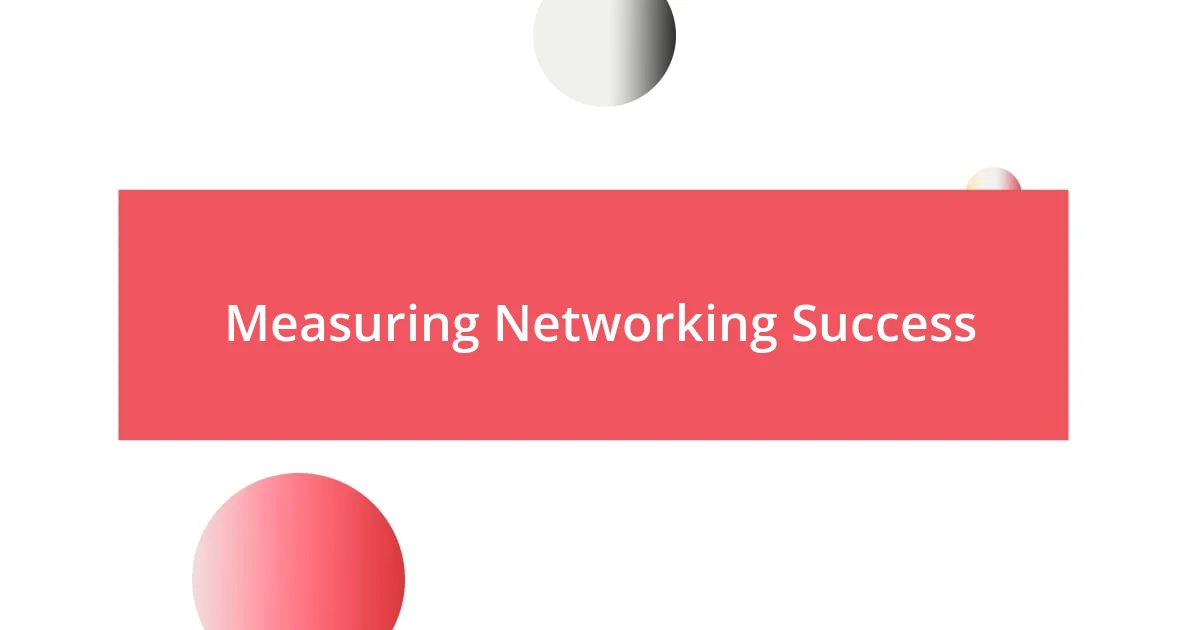
Measuring Networking Success
Measuring networking success can feel abstract, but I’ve found a few tangible ways to gauge its impact. One approach I take is to track meaningful conversations that blossom into opportunities. For instance, after a recent networking event, I followed up with several connections and found that about 30% led to collaboration discussions. It made me realize that quality engagements can often eclipse the sheer volume of contacts.
I also pay attention to the depth of my relationships. A year ago, I dedicated time to nurturing just ten key connections instead of trying to expand my network indiscriminately. Today, I can say that those ten individuals have become trusted advisors and collaborators, offering invaluable insights. Have you ever reflected on the strength of your connections over the numbers? It’s a practice that really reshaped my networking philosophy.
Another metric I use is feedback—both solicited and unsolicited. When someone reaches out to express appreciation for my expertise or even just to check in, I consider that a win. I once received a thoughtful email from someone I mentored a few months back. They shared how our discussions had influenced their career path, which reassured me that what I was doing truly mattered. In networking, isn’t it validating to know you’re making a real difference?



